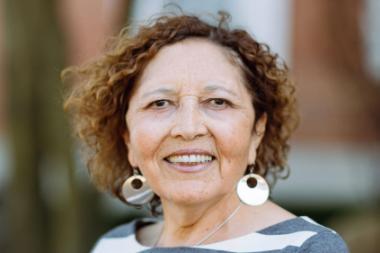December 2, 2020
Wheaton College welcomes Nancy Duarte-Gómez, who is serving the College as a Visiting Associate Lecturer in Psychology.
 Name: Nancy Duarte-Gómez
Name: Nancy Duarte-Gómez
Education:
Psy.D., Clinical Psychology, Wheaton College, 2003
M.A., Clinical Psychology, Wheaton College, 1996
Universidad Austral de Chile, Special Education Teacher, 1985
1. What was your favorite class in college? Why?
I studied Special Education (undergraduate) and I loved learning about techniques on how to support children in their development and becoming more functional in their daily lives. I specialized in Hearing and Speech Disorders, so I worked with deaf children mostly.
When I came to the USA to pursue my masters’ and doctoral degree in psychology, I just wanted to understand the psyche and how people develop psychological disorders from a Christian perspective. As practitioner I wanted to develop therapeutic skills to support those in psychological pain. I wanted to develop a Christian mind when approaching those issues. I enjoyed discussions on how integrating my faith into psychology, listening to different perspectives, and shaping my own. I loved those instances in the different classes.
2. Before Wheaton, what were you doing?
As soon as I graduated from the doctoral program, I moved back to my country of origin, Chile. There, I pursued a career in higher education, both, as a university professor and becoming the head of a psychology department. I also served the church, national and locally, serving the underserved, and I was able to keep a small private practice.
I came back to the USA in 2016, invited by a non-profit organization in the Chicago area to lead program on Healthy Relationship Education. I was the program director for this government funded program for three years. We served underserved population, teaching and strengthening healthy relationship skills in families, couples, and young adults. I trained the trainer, oversaw the curricula and managed the administrative aspects of the program.
3. What big question are you trying to answer through your work?
Just how to make the learning experience meaningful for the students. Inviting them to think beyond themselves, on how to support their personal development in wholistic way: from an academic perspective understanding psychology as a science, integrating their faith, and becoming their own persona.
I truly believe that getting education brings responsibilities with our society and world, so another big question would be how to open eyes, and promote interest towards a cross-cultural world, so we can serve better.
When working with clients, I just try to become curious about their lives and understanding the relational aspects that might have led to a psychological distress.
As a psychologist there is so much to offer to a broken world and learning how to approach the new challenges we face day to day, it is an opportunity as Christian practitioners or researchers, to bring some redemption to what God has created.
4. What has kept you busy during the pandemic?
- I kept offering therapeutic services in my private practice (through telehealth).
- Reconnecting with the student ministry in Chile, where I served for many years, as a student and after as associate staff.
- I have enjoyed bike rides around forest preserves in the area and socializing with beloved ones through zoom, face time, and so on.
- And, getting ready for the Fall teaching!
5. Do you get butterflies the night before the first day of school?
I do, but in a good way. It is exciting to get to know new students, even through a mask! This term will be different, but I am hopeful it will be still possible.
I usually ask myself with a sense of curiosity about my students lives, what they bring to the classroom, about their dreams and hopes, and about what troubles them. I pray for them in advance.
6. What would you have liked to tell the freshman version of yourself about going to college?
I had dreams, I wanted to learn, but I was also curious about the new academic experience. Will I be able to succeed? Will I be a good student? Will I honor the opportunity to access to higher education? Will I keep my faith? And so on. As in all adjustment process in life, it will be possible, and Yes, you will be able to do all of that, and more! Trust yourself, learn on how to adjust your schedule, so you can study, have fun, work out, meet new friends, and so on—even in these special circumstances.
7. When you’re not teaching or researching, what do you like to do?
I love biking, as well as cooking and reading an interesting book. I also take time to communicate with the people I care in Chile and here.